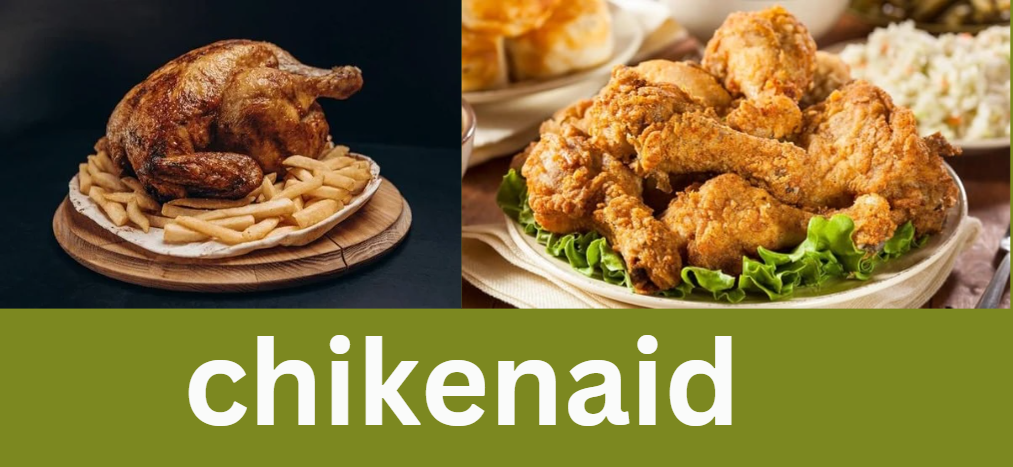Contents
- 1 Introduction
- 2 What is Chikenaid?
- 3 The Importance of Organic Poultry
- 4 The Science Behind Organic Poultry
- 5 Chikenaid’s Farming Practices
- 6 The Future of Organic Poultry with Chikenaid
- 7 How to Choose and Cook Chikenaid Products
- 8 The Economic Impact of Chikenaid
- 9 Consumer Perspectives on Chikenaid
- 10 Frequently Asked Questions (FAQs)
- 10.1 1. What makes Chikenaid’s chicken different from conventional chicken?
- 10.2 2. Is Chikenaid chicken more expensive than conventional chicken?
- 10.3 3. Where can I buy Chikenaid products?
- 10.4 4. How should I store Chikenaid chicken?
- 10.5 5. Are Chikenaid’s farming practices environmentally friendly?
- 11 Conclusion
Introduction
In a world increasingly concerned with health, sustainability, and ethical food choices, the food industry has seen a significant shift towards organic and natural products. Among these trends, organic poultry has become a focal point for consumers seeking healthier alternatives to conventionally raised chickens. One of the emerging leaders in this space is Chikenaid, a company dedicated to providing high-quality, organic chicken products that are free from antibiotics and genetically modified organisms (GMOs).
This article will delve into the core values of Chikenaid, its commitment to sustainability, and why it stands out in the competitive organic poultry market. We’ll also explore the broader implications of organic poultry for consumers, the environment, and animal welfare, and offer unique insights and analyses that go beyond what’s currently available online.
What is Chikenaid?
Chikenaid’s Mission and Vision
Chikenaid is a company that has made it its mission to revolutionize the poultry industry by focusing on the health and well-being of both consumers and animals. Their vision is simple yet powerful: to provide chickens raised in the most natural and ethical way possible. This commitment is reflected in every aspect of their business, from the feed they use to the farming practices they endorse.
The Chikenaid Difference
The primary difference between Chikenaid and conventional poultry producers lies in the company’s unwavering commitment to organic farming practices. Chikenaid ensures that all of its chickens are fed a 100% organic diet. This means no antibiotics, no GMOs, and no synthetic chemicals are used at any stage of production. The result is a product that is not only healthier for consumers but also more sustainable and ethical.
The Importance of Organic Poultry
Health Benefits of Organic Chicken
The health benefits of consuming organic chicken are numerous. Conventional chicken farming often involves the use of antibiotics and other chemicals that can have adverse effects on human health. These substances can lead to antibiotic resistance, hormonal imbalances, and even exposure to harmful pesticides. By contrast, organic chickens, like those raised by Chikenaid, are free from these harmful substances, offering a safer and healthier option for consumers.
Organic chicken is also richer in essential nutrients. Studies have shown that organic poultry tends to have higher levels of omega-3 fatty acids, which are crucial for heart health. Additionally, organic chickens are typically leaner, with less fat and more protein, making them a better choice for those looking to maintain a healthy diet.
Environmental Impact of Organic Farming
The environmental impact of organic farming cannot be overstated. Conventional farming practices often lead to soil degradation, water contamination, and a significant carbon footprint. Organic farming, on the other hand, promotes soil health through natural fertilization methods and avoids the use of harmful chemicals that can pollute waterways.
Chikenaid’s commitment to organic farming helps reduce the overall environmental impact of poultry production. By choosing organic feed and sustainable farming practices, Chikenaid minimizes its carbon footprint and contributes to the preservation of natural ecosystems.
Animal Welfare and Ethical Considerations
Animal welfare is a core principle at Chikenaid. Unlike many conventional farms where chickens are kept in overcrowded and unsanitary conditions, Chikenaid ensures that its chickens are raised in environments that allow for natural behaviors. This includes providing ample space, access to the outdoors, and a diet that mimics what chickens would naturally eat in the wild.
The ethical considerations of consuming organic chicken are also significant. Many consumers are increasingly concerned about the treatment of animals in the food industry. By choosing products from companies like Chikenaid, consumers can feel confident that they are supporting humane farming practices that prioritize the well-being of the animals.
The Science Behind Organic Poultry
Understanding Organic Certification
Organic certification is a rigorous process that ensures food products meet specific standards set by government bodies such as the USDA in the United States. For poultry to be certified organic, it must meet criteria related to feed, living conditions, and the absence of antibiotics and synthetic chemicals.
Chikenaid’s chickens are certified organic, meaning they have been raised according to these stringent standards. This certification is a testament to the company’s dedication to quality and transparency.
The Role of Diet in Organic Poultry
The diet of organic chickens is a critical factor in their overall health and the quality of the meat they produce. Chikenaid’s chickens are fed a 100% organic diet, which includes grains, seeds, and other natural food sources that are free from GMOs and synthetic pesticides. This diet not only contributes to the health of the chickens but also enhances the flavor and nutritional value of the meat.
Antibiotic Resistance and Public Health
One of the most pressing public health concerns associated with conventional poultry farming is antibiotic resistance. The overuse of antibiotics in animal farming has led to the development of antibiotic-resistant bacteria, which can pose a serious threat to human health. By raising chickens without the use of antibiotics, Chikenaid helps combat this issue, providing a safer option for consumers and reducing the risk of antibiotic-resistant infections.
Chikenaid’s Farming Practices
Sustainable Farming Techniques
Chikenaid employs a range of sustainable farming techniques designed to minimize environmental impact and promote animal welfare. These techniques include crop rotation, natural pest control, and the use of organic fertilizers. By focusing on sustainability, Chikenaid not only produces healthier chickens but also contributes to the long-term health of the planet.
Humane Treatment of Chickens
The humane treatment of chickens is a top priority for Chikenaid. The company ensures that its chickens have access to the outdoors, where they can forage and engage in natural behaviors. This approach not only improves the quality of life for the chickens but also results in healthier and more flavorful meat.
Transparency and Traceability
In today’s market, consumers are increasingly demanding transparency from the companies they purchase from. Chikenaid meets this demand by providing full traceability of its products. Consumers can trust that they are getting exactly what is promised—100% organic chicken raised in a humane and sustainable way.
The Future of Organic Poultry with Chikenaid
The Growing Demand for Organic Products
The demand for organic products, including poultry, is on the rise. As more consumers become aware of the health, environmental, and ethical benefits of organic food, companies like Chikenaid are well-positioned to meet this growing demand. The future of organic poultry looks bright, with Chikenaid leading the way in innovation and quality.
Innovations in Organic Farming
Chikenaid is not content to rest on its laurels. The company is constantly exploring new ways to improve its farming practices and product offerings. This includes investing in research and development to find even more sustainable methods of raising chickens and enhancing the nutritional profile of its products.
Expanding the Reach of Chikenaid
While Chikenaid is already a leader in the organic poultry market, the company has ambitious plans for expansion. By increasing its production capacity and expanding its distribution network, Chikenaid aims to make its products available to an even broader audience. This expansion will help bring the benefits of organic chicken to more consumers across the United States.
How to Choose and Cook Chikenaid Products
Selecting the Right Chikenaid Product
Chikenaid offers a range of organic chicken products, from whole chickens to pre-cut pieces and value-added products like organic chicken sausages and patties. When selecting a Chikenaid product, consider your cooking needs and preferences. For those looking to prepare a traditional roast chicken, a whole bird may be the best choice. For quick weeknight meals, pre-cut pieces or value-added products might be more convenient.
Cooking Tips for Organic Chicken
Cooking organic chicken can be slightly different from cooking conventional chicken due to its leaner meat and lack of additives. Here are a few tips to get the best results:
- Marinate or Brine: Since organic chicken is leaner, marinating or brining can help retain moisture and enhance flavor.
- Cook at Lower Temperatures: To prevent drying out, cook organic chicken at slightly lower temperatures and for longer periods.
- Use a Meat Thermometer: Ensure the chicken is cooked to an internal temperature of 165°F to avoid overcooking.
- Let it Rest: After cooking, allow the chicken to rest for a few minutes before cutting into it. This helps the juices redistribute, making for a juicier meal.
Pairing Suggestions
Organic chicken pairs well with a variety of flavors. For a classic dish, consider roasting the chicken with herbs like rosemary and thyme. For a more exotic flavor profile, try marinating the chicken in a blend of garlic, ginger, and soy sauce. Organic chicken’s natural flavor also complements a wide range of vegetables, grains, and legumes, making it a versatile option for any meal.
The Economic Impact of Chikenaid
Supporting Local Farmers
Chikenaid’s commitment to organic farming extends beyond its own operations. The company sources its feed and other materials from local, organic farms, supporting the broader agricultural community. This approach not only ensures the highest quality products but also contributes to the economic health of rural communities.
Job Creation and Industry Growth
As Chikenaid expands, it creates jobs and stimulates growth in the organic food sector. This growth is essential for the continued development of sustainable farming practices and the availability of organic products to a wider audience. By choosing Chikenaid, consumers are supporting an industry that prioritizes health, sustainability, and ethical farming.
Price Considerations and Value
While organic chicken is typically more expensive than conventional chicken, the value it offers in terms of health, environmental sustainability, and ethical considerations is significant. Chikenaid strives to keep its products accessible while maintaining the highest standards of quality. For consumers, this means getting a premium product that is worth the investment.
Consumer Perspectives on Chikenaid
Customer Reviews and Testimonials
Chikenaid has garnered positive reviews from customers who appreciate the quality and taste of its products. Many customers note the noticeable difference in flavor and texture compared to conventional chicken. Others highlight the peace of mind that comes with knowing they are consuming a product free from harmful chemicals and produced in an ethical manner.
Social Media Presence and Community Engagement
Chikenaid actively engages with its customers through social media, providing recipes, cooking tips, and information about their farming practices. This engagement helps build a loyal community of customers who are informed and passionate about organic food.
Challenges and Areas for Improvement
Like any company, Chikenaid faces challenges, including the higher costs associated with organic farming and the need to educate consumers about the benefits of organic poultry. However, the company is committed to overcoming these challenges through innovation, transparency, and a focus on customer satisfaction.
Frequently Asked Questions (FAQs)
1. What makes Chikenaid’s chicken different from conventional chicken?
Chikenaid’s chicken is raised on a 100% organic diet, free from antibiotics, GMOs, and synthetic chemicals. The chickens are also raised in humane conditions, with access to the outdoors and the ability to engage in natural behaviors.
2. Is Chikenaid chicken more expensive than conventional chicken?
Yes, Chikenaid chicken is typically more expensive due to the higher costs associated with organic farming. However, the benefits in terms of health, environmental sustainability, and animal welfare make it a worthwhile investment.
3. Where can I buy Chikenaid products?
Chikenaid products are available at select grocery stores and through their online store. The company is also expanding its distribution network to make its products more widely available.
4. How should I store Chikenaid chicken?
Chikenaid chicken should be stored in the refrigerator and used within a few days of purchase. For longer storage, it can be frozen and kept for several months.
5. Are Chikenaid’s farming practices environmentally friendly?
Yes, Chikenaid employs sustainable farming practices that minimize environmental impact. This includes the use of organic feed, natural pest control methods, and practices that promote soil health and biodiversity.
Conclusion
Chikenaid is more than just a brand; it represents a movement towards healthier, more sustainable, and ethical food choices. By choosing Chikenaid, consumers are not only getting a superior product but also supporting a company that is committed to making a positive impact on the world. As the demand for organic products continues to grow, Chikenaid is poised to lead the way in the organic poultry industry, offering innovative solutions that benefit consumers, animals, and the environment alike.



